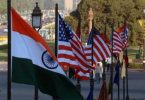At least 37 people were killed in an explosion at a Shiite mosque in southern Afghanistan’s Kandahar during the Friday prayer service.
Apart from the casualties, more than 70 others got injured, TOLO news reported. The service is typically attended by large crowds of worshippers, a Taliban spokesman said. Bilal Karimi said the explosion targeted a mosque in the southern province of Kandahar, one week after a similar attack struck north of the country. He did not provide more details and said an investigation was ongoing.
It was not immediately clear who perpetrated the attack. The mosque is frequented by the Shiite minority who are frequently targeted by the Islamic State group. Last week, IS claimed a suicide bombing inside a Shiite mosque in the northern province of Kunduz that killed 46 people.
The claim, carried by the IS-linked Aamaq news agency and cited by the SITE Intelligence Group, which monitors militant postings, came just hours after the blast tore through the packed mosque in the city of Kunduz on Friday.
The attack was the latest in a series of IS bombings and shootings that have targeted Afghanistan’s new Taliban rulers, as well as religious institutions and members of the country’s minority Shiites.
A blast went off Friday at a mosque packed with Shiite Muslim worshippers in northern Afghanistan, killing at least 46 people and wounding dozens in the latest security challenge to the Taliban as they transition from insurgency to governance.
The explosion tore through a mosque in the city of Kunduz during noon prayers, the highlight of the Muslim religious week. It blew out windows, charred the ceiling and scattered debris and twisted metal across the floor. Rescuers carried one body out on a stretcher and another in a blanket. Blood stains covered the front steps.
Area resident Hussaindad Rezayee said he rushed to the mosque when he heard the explosion, just as prayers started. “I came to look for my relatives, the mosque was full,” he said.
There was no immediate claim of responsibility for what Kunduz police said may have been a suicide attack. But militants from a local Islamic State affiliate have a long history of attacking Afghanistan’s ethnic and religious minorities.
The worshippers targeted Friday were Hazaras, who have long suffered from double discrimination as an ethnic minority and as followers of Shiite Islam in a majority Sunni country.
The Islamic State group has been behind a rise in attacks, including against the Taliban, since the departure of U.S. and NATO forces from Afghanistan at the end of August. IS and the Taliban, who seized control of the country with the exit of the foreign troops, are strategic rivals. IS militants have targeted Taliban positions and attempted to recruit members from their ranks.
In the past, the Taliban managed to contain the IS threat in tandem with U.S. and Afghan airstrikes. Without these, it remains unclear whether the Taliban can suppress what appears to be a growing IS footprint. The militants, once confined to the east, have penetrated the capital of Kabul and other provinces with new attacks.
This comes at a critical moment, as the Taliban attempt to consolidate power and transform their guerrilla fighters into a structured police and security force. But while the group attempts to project an air of authority through reports of raids and arrests of IS members, it remains unclear if it has the capability to protect soft targets, including religious institutions.
In Kunduz, police officials were still picking up the pieces Friday at the Gozar-e-Sayed Abad Mosque.







